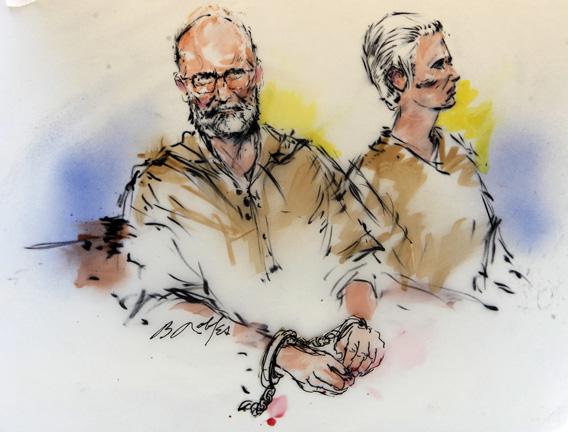When I was growing up in the ’80s and ’90s, just outside Boston, that old Irish tribalism still defined the city in a way it doesn’t quite anymore. Our top politicians, cops, columnists, and gangsters were all ethnic compatriots. Even my inner-ring suburb—rapidly becoming a haven for yuppie newcomers—still had a cordoned-off neighborhood nicknamed the Point that everyone knew as “the Irish part of town.” In the halls of my high school, Point kids stuck together. At parties, they’d draw a shamrock on the back of your hand when you paid for your keg cup.
Non-Irish wannabe kids like me—the Jews, the Lutherans, the Hindus—still bought into this weirdly collective Boston–Irish identity. We were Celtics fans, wearing green satin jackets embroidered with leprechauns. Some of us (to our later shame) fancied ourselves IRA supporters.
If there was a human embodiment of our blarney, it was the outlaw Whitey Bulger. Whitey was a near-mythical figure for a certain subset of Bostonians. He somehow defined our sense of provincial otherness. He looked out for his own. He had his own code. He was proud, tough, and cloistered, just like us.
It’s hard to overstate his legend. Anything seemed possible. I remember when Whitey, already a well-known racketeer, miraculously won the $14 million “Mass Millions” lottery back in 1991. It was so obvious the fix was in—it now seems likely that Whitey bullied the legitimate ticket holder into a “partnership”—and we lapped it up. We could not get enough of Whitey getting away with it. He was the outlaw who’d never be nabbed, the rakish bad guy with attitude.
He was also a cold-blooded killer who left grieving families in his wake. But some of us (to our later shame) didn’t let that ruin the fun.
On Monday, I sat in the federal courthouse in South Boston—a broken bottle’s throw from the projects where Whitey grew up, the insular neighborhood he presided over, the shallow graves he dug—and I watched a little old man walk stiffly into the courtroom and seat himself at the defendant’s table. Whitey is at last being tried for his crimes, including 19 murders.
He wore the same outfit he did in his early ’80s heyday: chunky white athletic shoes and a long-sleeved shirt tucked into high-waisted jeans. His blond hair (the source of his moniker) is all gone now, as is the snow-white beard he grew while on the lam. Not gone: that stern, immobile, terrifying glare.
In the evening, I tuned into NBC Nightly News, expecting coverage of the trial. There was none. Instead, they ran a segment on the George Zimmerman/Trayvon Martin trial, which was also in the jury selection stage. It appears that Whitey doesn’t merit national attention. Even the famously local Boston Globe—“HUB MAN DIES IN NUCLEAR BLAST; New York also destroyed”—ran the Zimmerman trial in the A section while burying Whitey in Metro.
The lack of national attention is a little odd to me. For years, Bulger was on the FBI’s 10 Most Wanted list, along with evildoers like Osama Bin Laden. He is an iconic American gangster in a mold we rarely see anymore—a Dillinger, a Capone, a Gotti. Maybe in the age of international terrorism and school shootings, the scale of evil has changed, and Whitey’s crimes don’t rate. But (and I say this with all respect possible to his victims and their families) there’s one thing that’s undeniable: The man is goddamned colorful.
Consider (and let’s put a big “allegedly” before all of these allegations):
- While in prison in his late 20s, Whitey was repeatedly dosed with LSD as part of a nefarious government study. This was before he was transferred to Alcatraz.
- During the ’70s busing crisis in Boston, Whitey protested the desegregation of Southie schools by firebombing JFK’s birthplace (he spray-painted “Bus Teddy” on the nearby sidewalk) and attempting to have Plymouth Rock detonated.
- In 1981, he had a businessman murdered in Tulsa, Okla. as part of a scheme to take over the World Jai Alai association.
- In 1984, he sent a small fishing boat full of weapons across the Atlantic Ocean in a doomed attempt to arm the IRA.
- His brother Billy—raised by the same parents, in the same home—went to law school, ran for office, and became one of the most powerful politicians in Massachusetts history. Billy was president of the state Senate for nearly two decades, and later president of the University of Massachusetts. Whitey buried three of his murder victims in the basement of a house he called “The Haunty”—a house that was down the street from Billy’s. And Billy was eventually pressured to resign over allegations that he’d protected Whitey from the law.
- Most amazingly (and most familiarly if you’ve ever watched The Departed), Whitey had his own man inside the FBI. As the legend goes, a teenaged Whitey bought a Southie kid named John Connolly a vanilla ice cream cone when Connolly was 8. Connolly never forgot. After he became an agent in the FBI bureau in Boston, Connolly immediately signed up Whitey as an informant—though Whitey considered himself a “strategist” or “liaison.” We’d always wondered how Whitey always got away with it, and this was how: Connolly turned a blind eye, quashed investigations, and in the end tipped Whitey off before the fuzz could close in. Connolly is now in prison on a murder rap related to his partnership with Whitey.
For all these reasons, and out of a personal longing to reconnect with the Boston of my youth and my imagination, I will be following the Bulger trial closely, and filing occasional dispatches to Slate.
The jury has been selected—and will include, to my amazement, a man who admitted to reading “hahf a dozen books ovah the yeehs” about Whitey and his exploits. Opening arguments are set to begin today. Stay tuned.
